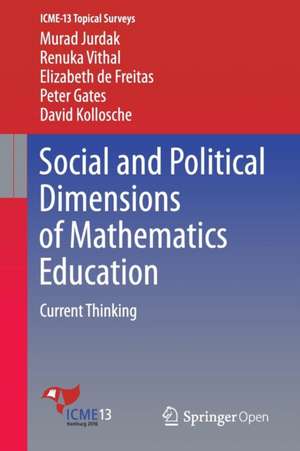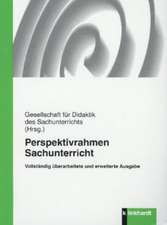Social and Political Dimensions of Mathematics Education: Current Thinking: ICME-13 Topical Surveys
Autor Murad Jurdak, Renuka Vithal, Elizabeth de Freitas, Peter Gates, David Kolloscheen Limba Engleză Paperback – 13 apr 2016
Din seria ICME-13 Topical Surveys
-
 Preț: 136.40 lei
Preț: 136.40 lei -
 Preț: 136.40 lei
Preț: 136.40 lei -
 Preț: 136.40 lei
Preț: 136.40 lei -
 Preț: 136.02 lei
Preț: 136.02 lei -
 Preț: 136.40 lei
Preț: 136.40 lei -
 Preț: 136.40 lei
Preț: 136.40 lei -
 Preț: 136.40 lei
Preț: 136.40 lei -
 Preț: 136.24 lei
Preț: 136.24 lei -
 Preț: 136.02 lei
Preț: 136.02 lei -
 Preț: 136.24 lei
Preț: 136.24 lei -
 Preț: 136.40 lei
Preț: 136.40 lei -
 Preț: 136.24 lei
Preț: 136.24 lei -
 Preț: 136.02 lei
Preț: 136.02 lei -
 Preț: 136.02 lei
Preț: 136.02 lei -
 Preț: 136.40 lei
Preț: 136.40 lei -
 Preț: 135.47 lei
Preț: 135.47 lei -
 Preț: 136.02 lei
Preț: 136.02 lei -
 Preț: 135.85 lei
Preț: 135.85 lei -
 Preț: 137.38 lei
Preț: 137.38 lei -
 Preț: 136.02 lei
Preț: 136.02 lei -
 Preț: 136.77 lei
Preț: 136.77 lei -
 Preț: 136.99 lei
Preț: 136.99 lei -
 Preț: 136.02 lei
Preț: 136.02 lei -
 Preț: 136.40 lei
Preț: 136.40 lei -
 Preț: 136.77 lei
Preț: 136.77 lei
Preț: 136.24 lei
Nou
Puncte Express: 204
Preț estimativ în valută:
26.08€ • 28.34$ • 21.92£
26.08€ • 28.34$ • 21.92£
Carte tipărită la comandă
Livrare economică 22 aprilie-06 mai
Preluare comenzi: 021 569.72.76
Specificații
ISBN-13: 9783319296548
ISBN-10: 331929654X
Pagini: 37
Ilustrații: VIII, 37 p.
Dimensiuni: 155 x 235 x 3 mm
Greutate: 0.08 kg
Ediția:1st ed. 2016
Editura: Springer International Publishing
Colecția Springer
Seria ICME-13 Topical Surveys
Locul publicării:Cham, Switzerland
ISBN-10: 331929654X
Pagini: 37
Ilustrații: VIII, 37 p.
Dimensiuni: 155 x 235 x 3 mm
Greutate: 0.08 kg
Ediția:1st ed. 2016
Editura: Springer International Publishing
Colecția Springer
Seria ICME-13 Topical Surveys
Locul publicării:Cham, Switzerland
Cuprins
1. Introduction.- 2. Survey of the Social and Political Dimensions of Mathematics Education.- 3. Summary and Looking Ahead.
Recenzii
“This volume … ‘represents the mainstreaming of this area of work as a scholarly and ongoing significant activity of the broader mathematics education community.’ … The current volume is therefore recommended both as a compelling synopsis of current thought on this topic, and as a cautionary tale about the perils of overstepping disciplinary bounds.” (Kira Hamman, MAA Reviews, July, 2017)
Textul de pe ultima copertă
This book examines the current thinking on five critical social and political areas in mathematics education. It focuses on material conditions in teaching and learning, and details features of social life and their influence on mathematics teaching, learning and achievement. Following an introduction, the first section addresses equitable access and participation in quality mathematics education. It explores this issue in different contexts and from different ideological perspectives. The second section traces the emergence and development of the notion of activism in mathematics education in theory, in the literature, in research and in practice. The third section then moves on to explore current research on the political forces at work in identity, subjectivity and (dis)ability within mathematics education, showing how emphasis on language and discourse provides information for this research, and how new directions are being pursued to address the diverse material conditions thatshape learning experiences in mathematics education. Economic factors behind mathematics achievement form the topic of section four, which examines the political dimensions of mathematics education through the influence of national and global economic structures. The final section addresses distribution of power and cultural regimes of truth, based on the premise that although often deemed apolitical, mathematics and mathematics education are highly political institutions in our society. The book concludes with a summary and recommendations for the future.
Caracteristici
Focuses on the material conditions of teaching and learning Details features of social life and their influence on mathematics teaching, learning and achievement Provides an overview of the research on the social and political dimensions of mathematics education Includes supplementary material: sn.pub/extras





